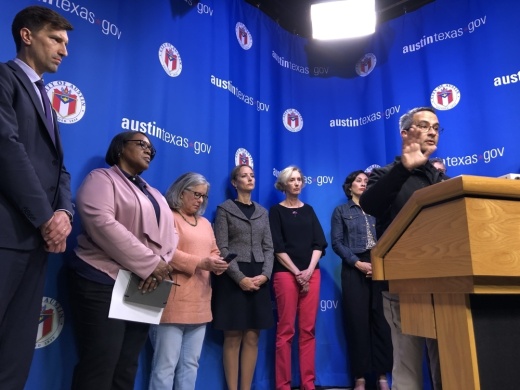University of Texas president Gregory Fenves wrote in a letter to the UT community that he and two family members are in self-isolation after his wife, Carmel Fenves, tested positive for coronavirus. Fenves said in the statement a second member of his family, who also works at UT, is presumed to have the virus as well.
“If you have had close contact with me or my family members or another person with COVID-19 and you are not exhibiting symptoms, we strongly recommend that you self-isolate starting today,” Fenves wrote in the letter.
Carmel Fenves began showing symptoms after returning from a trip to New York City over the weekend, per the statement. Gregory Fenves said she was tested for the coronavirus at 5:30 a.m. on March 13.
After Fenves posted a statement, Austin Public Health responded via a statement.
"Austin Public Health is the source of information for positive COVID-19 cases in our community. We understand the unique situation that the University of Texas is in," said an APH spokesperson. "However, per the CDC and state guidelines, we will not be providing information about individuals under investigation or monitoring. APH will continue working with our partners for the duration of this response."
Original Story
“This news came several hours after local health officials had announced two other, separate cases in Travis County,” he wrote.
Local government officials, health professionals and event organizers have been working over the past week to prevent the spread of coronavirus should it come to the local area. Early on March 13, Austin Public Health confirmed the first two presumptive positive cases of the disease.
Presumptive positive cases have been tested in a local lab and come back positive, but have not yet been confirmed by the Centers for Disease Control and Prevention.
Dr. Mark Escott, Austin-Travis County interim health authority, said in a media conference March 13 the individuals who tested positive in the Austin area are a male in his 60s, who is hospitalized, and a female in her 30s, who is quarantined at home.
“These do not represent community spread of the disease. They’re epidemiologically linked to another case or another jurisdiction,” Escott said.
Escott said Austin Public Health officials were advised by officials in Montgomery County, near Houston, that the woman was a person under investigation for the virus when she traveled to Austin.
“At that stage we made contact with her and issued control orders,” Escott said.
The other individual is from a rural area, according to Escott, and was admitted to a hospital in that area before being transferred to Austin, where he was diagnosed with the disease.
Escott, Travis County Judge Sarah Eckhardt and Austin Mayor Steve Adler said the confirmation of cases in the Austin area were always likely, and the best thing the community can do now is continue good hygiene practices such as frequent handwashing and avoiding touching their eyes, nose or mouth.
“This is a virus we have known was coming to us. It is now coming to us. The question for our community is as it gets here is how quickly does it spread?” Adler said.
According to the Johns Hopkins University Center for Systems Science and Engineering, which is tracking the disease worldwide, there have been more than 1,700 cases in the U.S. as of March 13.
Texas Gov. Greg Abbott is scheduled to give a media conference at noon to provide more information on the statewide response.
In response to the presumptive positive cases, Austin ISD and The University of Texas at Austin both canceled classes March 13 ahead of their spring breaks scheduled to begin March 16.





